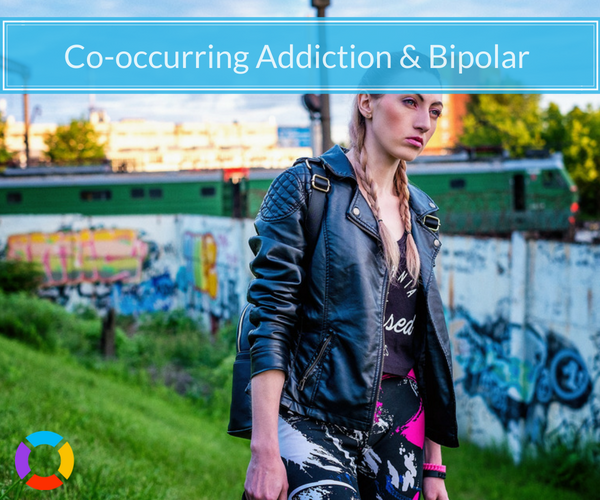Coping With Bipolar Disorder and Addiction: Free Daily Recovery Tool

Living with bipolar disorder and addiction can feel overwhelming, but you’re not alone. These two conditions can occur together and create a cycle that’s difficult to break without the right support.
When bipolar disorder and drug addiction go untreated, the risks grow. Your health and relationships can be seriously impacted. The good news is that help is available. Understanding the link between these conditions is the first step toward recovery.
In this article, we’ll explore why bipolar disorder and addiction are so closely connected. We’ll also discuss the dangers of leaving them untreated and highlight practical strategies and treatment options that can help you or your loved one manage symptoms and find lasting healing.
Living with bipolar disorder and addiction can feel overwhelming but daily structure can make all the difference. Download our free Bipolar & Addiction Recovery Daily Planner to track moods, manage triggers and build healthy routines that support recovery.
What Is Bipolar Disorder?
Bipolar disorder is a mental health condition that causes intense shifts in mood, energy and behavior. These changes can range from extreme highs, known as mania or hypomania, to deep lows of depression.
These extreme mood fluctuations can make everyday life and routines difficult to manage. But appropriate bipolar treatment can make a significant difference in your life.
Symptoms of Bipolar Disorder
Bipolar disorder symptoms are marked by shifts between manic, hypomanic and depressive episodes. During mania, you may feel an intense surge of energy, racing thoughts, reduced need for sleep or impulsive behaviors that can lead to risky decisions.
Hypomania has similar but less severe symptoms. You may experience an elevated mood and increased energy. But you might also experience anxiety, impulsivity or irritability. You may find it difficult to focus. Like mania, hypomania can significantly disrupt your daily life.
On the other end of the mood spectrum is bipolar depression. You may feel overwhelming sadness, fatigue, hopelessness and loss of interest in activities.
When combined, the challenges of bipolar depression and alcohol abuse worsen symptoms, making effective treatment and support crucial.
Want to know more? Call now for help.
Types of Bipolar Disorder
There are several types of bipolar disorder, each with unique patterns of mood changes.
- Bipolar I Disorder must have at least one full manic episode, often followed by depressive episodes. When combined, bipolar 1 disorder and alcohol can become more severe and harder to manage.
- Bipolar II Disorder is marked by recurring depressive episodes and hypomanic episodes, which can interfere with daily responsibilities and relationships.
- Cyclothymic Disorder includes numerous periods of hypomanic symptoms and mild depression lasting for two years or more, though symptoms are less extreme than Bipolar I or II.
- Unspecified Bipolar Disorder is diagnosed when symptoms don’t clearly fit into the other categories but still cause significant disruption.
Causes of Bipolar Disorder
Why does bipolar disorder occur? While there isn’t a single answer, research points to several key influences.
Genetics plays an important role. If a close family member has bipolar disorder, your risk of developing the condition increases.
Brain chemistry is another factor because imbalances in neurotransmitters can disrupt mood regulation. Past trauma or stressful life events may also trigger or worsen symptoms, especially if you are already vulnerable.
Finally, environmental factors such as chronic stress, sleep disruption or substance use can influence when symptoms appear or worsen.
Bipolar Disorder and Addiction Statistics
In the U.S., roughly 2.8% of adults experience bipolar disorder in a given year, with similar rates among men and women.
Research also shows that over 50% of people with bipolar I or II go on to develop a substance use disorder during their lifetime, highlighting the significant overlap in statistics on bipolar disorder and addiction.
Living with both conditions comes with increased challenges: you can face a substantially higher suicide risk, with lifetime attempts reported in up to 60% of people with bipolar disorder and suicide completion rates reaching roughly 20%. Hospitalizations are also more common, particularly during manic episodes.
Research has also revealed a bidirectional association between bipolar disorder and obesity, indicating that bipolar disorder increases your risk of obesity and obesity increases your risk of developing bipolar disorder.
Why Do Bipolar Disorder and Addiction Co-Occur?
Bipolar disorder and addiction often influence each other, creating a cycle that can be difficult to break.
You may turn to substances to manage intense mood swings but alcohol or drug use can worsen symptoms and trigger new episodes. This makes both conditions more challenging to treat.
The Self Medication Cycle
One of the primary reasons bipolar disorder and addiction occur together is the tendency to self medicate. If you turn to alcohol, drugs or nicotine in an attempt to cope with the mood swings, the substances may offer temporary relief, but they typically worsen mood instability over time.
The cycle of alcohol and bipolar disorder makes symptoms harder to manage and increases the risk of developing an addiction.
Brain Chemistry and Dopamine Dysregulation
Substances like alcohol or drugs can temporarily boost dopamine, which is the brain’s “reward” chemical. While this may “feel like relief” from the intense mood swings, over time this disrupts brain chemistry further and this can make symptoms more severe and increasing the risk of addiction.
Genetic and Environmental Risks
Both bipolar disorder and addiction share strong ties to genetics and environmental triggers, like ongoing stress or trauma.
If you have a family history of either condition, your likelihood of developing it is higher than the general population. These risks don’t guarantee that you’ll develop bipolar disorder or addiction but they highlight how closely biology and environment interact.
Bipolar Disorder and Alcohol
Alcohol is one of the most common substances linked to addiction and bipolar disorder. The effects can make symptoms even harder to manage. While you might drink to cope with mood swings, alcohol often intensifies depression, increases impulsivity and raises the risk of dangerous behaviors.
Alcohol and Medications for Bipolar
Mixing bipolar and alcohol with prescribed medications can be dangerous. Alcohol can reduce the effectiveness of mood stabilizers, antidepressants or antipsychotics, making symptoms harder to control. These interactions can cause harmful side effects, like extreme drowsiness, liver damage or increased mood instability.
Even occasional drinking with bipolar disorder raises the risk of relapse, since alcohol can trigger manic or depressive episodes. Avoiding alcohol while taking medication for bipolar disorder is a crucial step to protect your recovery and maintain stability.
Alcohol Induced or Alcohol Triggered Bipolar Disorder
Can alcoholism cause bipolar disorder? While alcohol itself does not directly cause the condition, heavy or long term drinking can mimic or worsen symptoms that look like bipolar episodes. This can make it difficult to tell whether mood changes are due to alcohol use, an underlying mental health disorder or both.
The term alcohol induced bipolar disorder refers to situations where bipolar disorder and drinking trigger severe mood swings resembling mania or depression. In some cases, alcohol can bring on the first noticeable bipolar episode in someone already genetically or biologically predisposed.
Managing bipolar disorder takes more than willpower; it takes tools. Our Bipolar & Addiction Recovery Daily Planner gives you space to log your symptoms, reflect on triggers and celebrate small wins every day. It’s designed to help you stay balanced while working through recovery.
Other Substances and Addictions in Bipolar Disorder
Bipolar disorder not only overlaps with alcohol use but it can also be complicated by other substances and behaviors. You might turn to drugs or addictive activities in an attempt to manage mood swings, but these choices often worsen symptoms and create new health risks.
Understanding the connection between bipolar disorder and addiction helps you break the cycle and build a more stable recovery.
- Bipolar and Stimulants: Substances like cocaine and meth trigger sharp dopamine spikes that may briefly elevate mood, but they also increase the risk of psychosis and severe manic episodes.
- Bipolar and Marijuana: Some people use marijuana for short term relief from anxiety or depression but it can worsen mood instability and interfere with treatment.
- Bipolar and Opioids/Sedatives: Often used to numb depression, these substances raise the risk of dependence and overdose.
- Prescription Drugs and Bipolar: ADHD medications such as Concerta can be misused, leading to worsening mania and unsafe patterns of use.
- Behavioral Addiction in Bipolar Disorder: Beyond substances, compulsive behaviors like gambling, sex, shopping, food or gaming can also spiral during manic or depressive states, triggering financial, social and emotional consequences.
Short Term and Long Term Effects of Bipolar Disorder and Addiction
Living with bipolar disorder and drug abuse affects more than just your moods. It can change the course of your daily life and long term health. The impact may start small, but over time, untreated symptoms and substance use can lead to serious consequences for your mind and body.
Recognizing these risks is the first step toward seeking support and effective treatment.
- Short Term Effects: Mood swings, impulsive or risky behavior and frequent relationship breakdowns are common when bipolar disorder and addiction occur together.
- Long Term Effects: Without proper care, you face higher risks of suicide, psychosis, chronic illness and repeating cycles of relapse.
Signs You or a Loved One Struggles with Bipolar and Addiction
Recognizing the signs of bipolar disorder and substance abuse is an important step toward getting help. When bipolar and alcohol or other substances are involved, symptoms of both conditions usually overlap and this can make it harder to tell what’s really happening.
You may notice extreme mood swings, from bursts of energy and euphoria to deep sadness or hopelessness. Risky behaviors, such as reckless spending, unsafe sex or heavy drinking, often increase during manic phases.
During depressive episodes, withdrawal, fatigue and using substances to cope are common warning signs. If you or a loved one is caught in this cycle, it’s time to seek bipolar disorder support and dual diagnosis treatment.
Treatment and Recovery Options for Bipolar and Addiction
Managing bipolar disorder and addiction requires a comprehensive approach that addresses both conditions at the same time. Treatment can include medical care, therapy and long term support designed to help you build stability and prevent relapse.
Detox Treatment: This is the first step toward recovery. You’ll work with mental health professionals to achieve physical and mental stabilization as your body detoxifies from addictive substances. Medically assisted treatment can help manage withdrawal symptoms and reduce cravings.
Inpatient Rehabilitation and Dual Diagnosis Programs: These programs provide 24/7 care, combining structured treatment for substance abuse with specialized care for bipolar disorder. This ensures that both conditions are treated simultaneously.
Outpatient Programs: Outpatient programs are typically available at various intensity levels. Traditional outpatient care, intensive outpatient programs (IOPs) and partial hospitalization programs (PHPs) are best when you have a milder form of addiction and bipolar disorder.
They are also effective after detox and stabilization or a more intensive inpatient program.
Medication and Therapy Approaches: Your mental health professional may recommend medications to address your bipolar symptoms such as antidepressants or antipsychotics. Other medications may be used to reduce withdrawal symptoms and cravings such as suboxone and naltrexone for opioid addiction.
Medication is typically best used alongside therapeutic approaches like cognitive behavioral therapy for bipolar disorder, skills training and interpersonal therapy for a whole person approach to recovery.
Long Term Recovery and Support: Ongoing care may include peer support groups, relapse prevention strategies and regular check ins with mental health providers to maintain progress and manage symptoms. These strategies are effective alongside lifestyle changes that support recovery and sobriety.
You don’t need to recover alone. Call today.
Family Support for Bipolar and Addiction
When a loved one struggles with bipolar disorder and addiction, family support can make a meaningful difference. The goal is to offer encouragement and structure without enabling unhealthy behaviors.
Families can participate in interventions to guide a loved one toward treatment, seek out education to better understand dual diagnosis and join support groups to share experiences and build coping strategies. With the right balance of compassion and boundaries, families play a vital role in long term recovery.
You don’t have to face bipolar disorder and addiction alone. Take the first step toward stability with our free Bipolar & Addiction Recovery Daily Planner created to help you stay focused, track progress and move forward with confidence.
FAQs About Bipolar Disorder and Addiction
Bipolar disorder occurs due to a combination of genetic, brain chemistry and environmental factors that influence mood regulation.
No, you cannot grow out of bipolar disorder but with the right treatment and support, symptoms can be effectively managed throughout your life.
Drug induced bipolar disorder does not occur. However, drugs and addiction can trigger or worsen mood episodes in people who are already genetically or biologically vulnerable.
Living with a loved one who has bipolar disorder and alcohol abuse requires setting healthy boundaries while offering consistent support.
Encouraging professional treatment, joining family support groups and learning about both conditions can help you navigate challenges more effectively.
Bipolar disorder is not considered degenerative but without mood disorder treatment, repeated mood episodes can worsen over time and increase health risks.
When to Seek Professional Help
If bipolar disorder and addiction begin leading to dangerous behaviors, severe mood swings and increasing substance dependence, it’s time to seek professional help. Red flags such as suicidal thoughts, self harm or psychosis require immediate treatment.
If you or a loved one is in crisis, call 988 in the U.S. to connect with the Suicide & Crisis Lifeline, or dial 911 for emergencies. Getting help quickly can save lives and start you on the path to recovery.
Conclusion: Hope for Healing from Bipolar and Addiction
While living with bipolar disorder and addiction can feel overwhelming, it’s important to remember that both conditions are treatable with the right integrated care. Recovery is possible when you combine professional treatment with strong support systems and healthy coping strategies.
If you or a loved one is struggling, don’t wait. Explore treatment resources and connect with a detox or rehab center today to take the first step toward lasting stability and healing.



